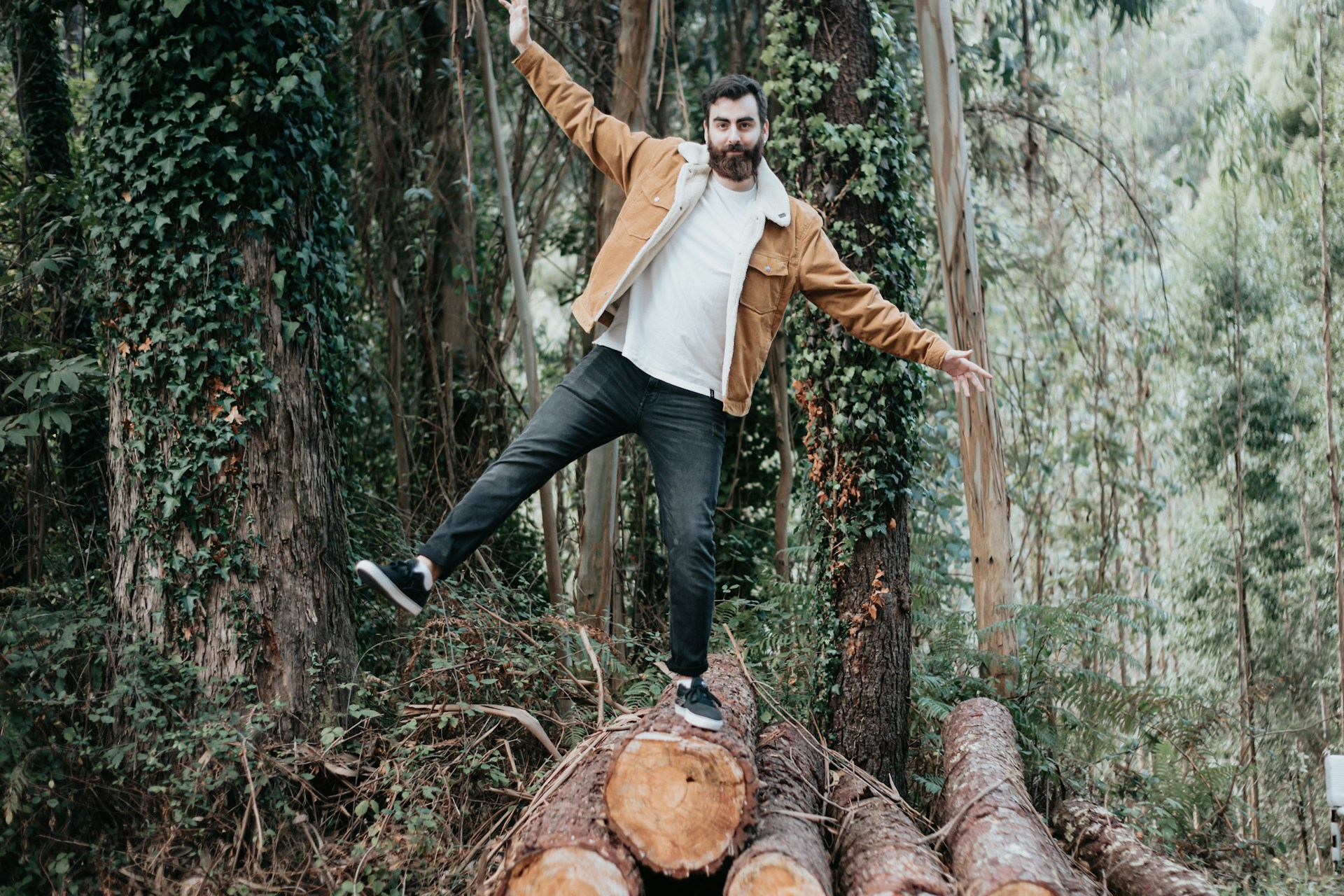Osho speaks on ‘Balancing’: “Live life in all possible ways; don’t choose one thing against the other, and don’t try to be in the middle.”

Life consists of extremes. Life is a tension between the opposites. To be exactly in the middle for ever means to be dead. The middle is only a theoretical possibility; only once in a while are you in the middle, as a passing phase. It is like walking on a tightrope: you can never be exactly in the middle for any length of time. If you try, you will fall.
To be in the middle is not a static state, it is a dynamic phenomenon. Balance is not a noun, it is a verb; it is balancing. The tightrope-walker continuously moves from the left to the right, from the right to the left. When he feels now he has moved too much to the left and there is fear of falling, he immediately balances himself by moving to the opposite, to the right. Passing from the left to the right, yes, there is a moment when he is in the middle. And again when he has moved too much to the right, there is fear of falling, he is losing balance, he starts moving towards the left. Passing from the right to the left, again he moves through the middle for a moment.
This is what I mean when I say balance is not a noun but a verb – it is balancing, it is a dynamic process. You cannot be in the middle. You can go on moving from left to right and right to left; this is the only way to remain in the middle.
Don’t avoid extremes, and don’t choose any one extreme. Remain available to both the polarities – that is the art, the secret of balancing. Yes, sometimes be utterly happy, and sometimes be utterly sad – both have their own beauties.
Our mind is a chooser; that’s why the problem arises. Remain choiceless. And whatsoever happens and wherever you are, right or left, in the middle or not in the middle, enjoy the moment in its totality. While happy, dance, sing, play music – be happy! And when sadness comes, which is bound to come, which is coming, which has to come, which is inevitable, you cannot avoid it… if you try to avoid it you will have to destroy the very possibility of happiness. The day cannot be without the night, and the summer cannot be without the winter, and life cannot be without death.
Let this polarity sink deep in your being – there is no way to avoid it. The only way is to become more and more dead. Only the dead person can be in a static middle. The alive person will be constantly moving – from anger to compassion, from compassion to anger. And he accepts both! And he is not identified with either. He remains aloof and yet involved. He remains distant yet committed. He enjoys and yet he remains like a lotus flower in water — in water, and yet the water cannot touch it.
Your very effort to be in the middle, and to be in the middle for ever and always, is creating an unnecessary anxiety for you. In fact, to desire to be in the middle for ever is another extreme, the worst kind of extreme, because it is the impossible kind. It cannot be fulfilled.
Just think of an old clock: if you hold the pendulum exactly in the middle, the clock will stop. The clock continues only because the pendulum goes on moving from the left to the right, from the right to the left. Yes, each time it passes through the middle, and there is a moment of that middleness, but only a moment. And it is beautiful! When you pass from happiness to sadness, and from sadness to happiness, there is a moment of utter silence exactly in the middle — enjoy that too.
Life has to be lived in all its dimensions, only then is life rich. The leftist is poor, the rightist is poor, and the middlist is dead! The alive person is neither rightist nor leftist nor middlist — he is a constant movement, he is a flow.
Why do we want to be in the middle in the first place? We are afraid of the dark side of life; we don’t want to be sad, we don’t want to be in a state of agony. But that is possible only if you are also ready to drop the possibility of being in ecstasy. There are a few who have chosen it – that is the way of the monk. For centuries that has been the way of the monk. He is ready to sacrifice all possibilities of ecstasy just to avoid agony. He is ready to destroy all roseflowers just to avoid the thorns. But then his life is just flat… a long long boredom, stale, stagnant. He does not really live. He is afraid to live!
Life contains both: it brings great pain, it also brings great pleasure. Pain and pleasure are two sides of the same coin. If you leave one, you have to leave the other too. […]
Live life in all possible ways; don’t choose one thing against the other, and don’t try to be in the middle. And don’t try to balance yourself – balance is not something that can be cultivated by you. Balance is something that comes out of the experience of all the dimensions of life. Balance is something that happens; it is not something that can be brought. If you bring it it will be false, forced; and if you bring it you will remain tense, you will not be relaxed, because how can a man who is trying to remain balanced, in the middle, be relaxed? He will always be afraid: if he relaxes he may start moving towards the left or towards the right – he is bound to remain uptight. And to be uptight is to miss the whole opportunity, the whole God-given gift.
Don’t be uptight. Don’t live life according to principles. Live life in its totality, drink life in its totality! Yes, sometimes it tastes bitter – so what? That taste of bitterness will make you capable of tasting its sweetness. You will be able to appreciate the sweetness only if you have tasted its bitterness. The man who knows not how to cry will not know how to laugh either. And the man who cannot have a deep laughter, a belly-laughter, his tears will be crocodile tears – they cannot be true, they cannot be authentic.
I don’t teach you the middle way: I teach you the total way. And then a balance comes of its own accord. And then that balance has tremendous beauty and grace – you have not forced it, it has come. By moving gracefully to the left, to the right, in the middle, slowly slowly, a balance comes to you, because you remain so unidentified. When sadness comes you know it will pass, and when happiness comes you know it will pass too. Nothing remains. Everything passes by.
The only thing that always abides is your witnessing. That witnessing brings balance. That witnessing is balance.
Osho, The Fish in the Sea Is Not Thirsty, Ch 11
Quote published in The Book: An Introduction to the Teachings of Bhagwan Shree Rajneesh
Index Osho A-Z
Featured image credit to Ave Calvar on unsplash.com




Comments are closed.